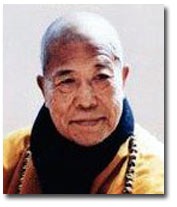

Venerable
Master Hsuan Hua
Organisation: Dharma Realm Buddhist Association
 |
 |
| Venerable
Master Hsuan Hua |
|
The Dharma Realm Buddhist Association (DRBA), formerly known as the Sino-American Buddhist Association, was founded by the Venerable Master Hsuan Hua in 1959. It was established as a state and federally approved non-profit religious and educational corporation for the purpose of bringing the orthodox teachings of the Buddha to the entire world. In 1962, Master Hua accepted his disciples' invitation to come to America. In 1966 he set up an in-residence Buddhist study and practice center in San Francisco. In 1970 the center moved to larger quarters and became one of Northern California's foremost Buddhist centers, Gold Mountain Monastery. Later the Association founded a number of other centers: The International Institute for the Translation of Buddhist Texts (1973), The Sagely City of Ten Thousand Buddhas in Talmage (1976), Gold Wheel Sagely Monastery in Los Angeles (1976), Gold Buddha Sagely Monastery in Vancouver (1984), Gold Summit Sagely Monastery in Seattle (1984), Avatamsaka Sagely Monastery in Calgary (1986), and Proper Dharma Buddhist Academy in Taiwan (1989). The Sagely City of Ten Thousand Buddhas also houses Dharma Realm Buddhist University, Developing Virtue Secondary School, and Instilling Goodness Elementary School. Biography: The Dharma name of the Elder Venerable Master Hsuan Hua was An Tzu (Peace and Compassion), also known as Tu Lun (Liberate from the Wheel of Rebirth). He was the Ninth Patriarch of the Wei-Yang Chan (Chinese Zen) School of Buddhism and was granted the Dharma Seal of the Wei-Yang lineage from the elder Venerable Master Hsu Yun. The Master's Dharma-Transmission name was Hsuan Hua (Proclaim and Transform), but he often referred to himself as "a living dead person", or "the Monk in the Grave." Throughout his life, he never wanted fame or profit, and he had no desire to contend with others even more so. Instead, he said that he would rather be "a little bug," or "a small ant" beneath the feet of all living beings, and used his body as a stepping-stone for living beings that sought to transcend from commoners straight to the ground of the Buddha. Early Years As a child, the Master followed his mother's example and ate only vegetarian food and recited the Buddha's name. The Master was quiet and un-talkative by nature, but he had a righteous and heroic spirit. At the age of eleven, upon seeing a neighbor's infant who had died, he became aware of the great matter of birth and death and the brevity of life and resolved to leave the home-life. At the age of twelve, he heard of how Filial Son Wong of Shuangcheng County (later known as Great Master Chang Ren) had practiced filial piety and attained the Way, and he vowed to follow the Filial Son's example. Repenting for being un-filial to his parents in the past, the Master decided to bow to his parents every morning and evening as a way of acknowledging his faults and repaying his parents' kindness. He gradually became renowned for his filial conduct, and people called him Filial Son Bai. At fifteen, he took refuge under the Venerable Master Chang Zhi. That same year he began to attend school and mastered the Four Books, the Five Classics, the texts of various Chinese schools of thought, and the fields of medicine, divination, astrology, and physiognomy. During his student years, he also participated in the Moral Society and other charitable societies. He explained the Sixth Patriarch's Sutra, the Vajra Sutra, and other Sutras for those who were illiterate, and started a free school for those who were poor and needy. Leaving the Home Life One day as he was sitting in meditation, he saw the Great Master, the Sixth Patriarch, come to his hut and tell him, "In the future you will go to the West, where you will meet limitless and boundless numbers of people. The living beings you teach and transform will be as countless as the sands of the Ganges River. That will mark the beginning of the Buddha dharma in the West." After the Sixth Patriarch finished speaking, he suddenly vanished. When his observance of filial piety was completed, the Master went to Changbai Mountain and dwelled in seclusion in the Amitabha Cave, where he practiced austerities. Later he returned to Sanyuan Monastery, where he was chosen to be the head of the assembly. During the period that he lived in Manchuria, the Master contemplated people's potentials and bestowed appropriate teachings. He awakened those who were confused and saved many people's lives. Countless dragons, snakes, foxes, ghosts, and spirits requested to take refuge and receive the precepts from him, changing their evil and cultivating goodness. Dharma Transmission During his arduous journey, he stayed at many of the renowned monasteries of Mainland China. In 1947 he went to Potola Mountain to receive the complete ordination. In 1948 he reached Nanhua Monastery at Caoxi of Guangzhou, where he paid homage to Elder Master Hsu Yun and was assigned to be an instructor in the Nanhua Monastery Vinaya Academy. Later he was appointed as Dean of Academic Affairs. The Elder Master Hsu Yun saw that the Master was an outstanding individual in Buddhism and transmitted the Dharma lineage to him, giving him the Dharma name Hsuan Hua and making him the Ninth Patriarch of the Wei Yang Sect, the forty-fifth generation since the First Patriarch Mahakashyapa. Residing in Hong Kong Bringing the Dharma
to the West Ven. Master Hsuan Hua, is deceased since 1995. Main Centre: Administrative Headquarters of the Dharma Realm Buddhist Association in Burlingame, California, USA. Address: 1825, Murchison Drive Burlingame, CA 94010-4504 U.S.A. Tel: (415) 421-6117 (415) 692-5912 Books/Publications: Master Hsuan Hua books and publications can be found at: The International
Translation Institute
|
| |
|
|
|
|
|